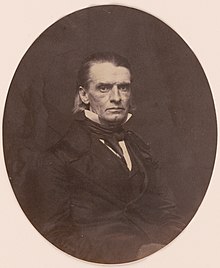
Back هنري ألكسندر وايس Arabic هنرى الكسندر وايس ARZ هنری ائی. ویس AZB Генры Уайз Byelorussian Henry A. Wise German Henry A. Wise Spanish Henry A. Wise French הנרי וייז HE Henry A. Wise (politico 1806) Italian ヘンリー・アレクサンダー・ワイズ Japanese
Henry A. Wise | |
|---|---|
 | |
| 33rd Governor of Virginia | |
| In office January 1, 1856 – January 1, 1860 | |
| Lieutenant | Elisha W. McComas William Lowther Jackson |
| Preceded by | Joseph Johnson |
| Succeeded by | John Letcher |
| 6th United States Minister to Brazil | |
| In office August 10, 1844 – August 28, 1847 | |
| President | John Tyler James K. Polk |
| Preceded by | George H. Proffit |
| Succeeded by | David Tod |
| Member of the U.S. House of Representatives from Virginia | |
| In office March 4, 1833 – February 12, 1844 | |
| Preceded by | Richard Coke Jr. |
| Succeeded by | Thomas H. Bayly |
| Constituency | 8th district (1833–1843) 7th district (1843–1844) |
| Personal details | |
| Born | Henry Alexander Wise December 3, 1806 Drummondtown, Virginia |
| Died | September 12, 1876 (aged 69) Richmond, Virginia |
| Political party | Jacksonian (1832–1834) Whig (1834–1842) Democratic (1842–1868) Republican (after 1868) |
| Children | 14, including Richard Alsop and John Sergeant |
| Parent |
|
| Alma mater | Washington College Winchester Law School |
| Profession | Politician, lawyer |
| Signature | |
| Military service | |
| Allegiance | Confederate States |
| Branch/service | Confederate States Army |
| Years of service | 1861–1865 |
| Rank | Brigadier General |
| Unit | Army of Northern Virginia |
| Battles/wars | American Civil War |
Henry Alexander Wise (December 3, 1806 – September 12, 1876) was an American attorney, diplomat, politician and slave owner[1] from Virginia. As the 33rd Governor of Virginia, Wise served as a significant figure on the path to the American Civil War, becoming heavily involved in the 1859 trial of abolitionist John Brown. After leaving office in 1860, Wise also led the move toward Virginia's secession from the Union in reaction to the election of Abraham Lincoln and the Battle of Fort Sumter.
In addition to serving as governor, Wise represented Virginia in the United States House of Representatives from 1833 to 1844 and was the United States Minister to Brazil during the presidencies of John Tyler and James K. Polk. During the American Civil War, he was a general in the Confederate States Army. In politics, Wise was consecutively a Jacksonian Democrat, a Whig supporter of the National Bank, a dissident Whig supportive of President Tyler, a Democratic secessionist, and a Republican supporter of President Ulysses S. Grant during Reconstruction. His sons Richard Alsop Wise and John Sergeant Wise both also served in the Confederate Army and the post-war United States House as Republicans. After the Civil War ended, Wise accepted that slavery had been abolished and advocated a peaceful national reunification.
- ^ Weil, Julie Zauzmer; Blanco, Adrian; Dominguez, Leo. "More than 1,800 congressmen once enslaved Black people. This is who they were, and how they shaped the nation". Washington Post. Retrieved February 20, 2023.